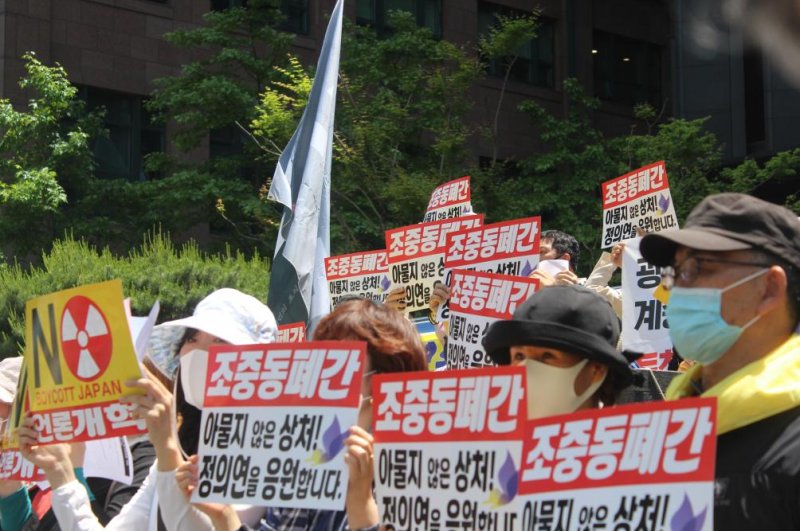South Korea 'comfort women' activist group battles to survive amid scandal
The South Korean organization that first raised the issue of "comfort women" is defending its activities as counter-protests grow.
by Elizabeth Shim


SEOUL, May 27 (UPI) -- An influential South Korean organization that has claimed for decades it represents the interests of "comfort women" forced to work in Japanese wartime brothels may be fighting for its life, in the wake of fund misappropriation allegations against the group's founder, Yoon Mi-hyang.
The Korean Council for Justice and Remembrance for the Issues of Military Sexual Slavery suggested at its weekly rally on Wednesday that the organization has been hit hard, following accusations from former comfort woman Lee Yong-soo that the victims were used as a front for Yoon's donation drives.
The group did not clarify whether the setbacks were financial, but did say activities among affiliated groups had "diminished" in the wake of the charges.
Lee Na-young, the newly elected president of the council, said the organization is "looking back and re-examining" the group's mistakes, including "being unable to resolve the pain of the victims and the prolonging of the problem for 30 or so years."
Lee did not directly address the accusations against Yoon, which include purchasing personal real estate and paying for tuition at an expensive U.S. school -- using money intended for the victims. The organization is believed to have collected at least millions of dollars.
Lee said the scandal fundamentally undermines the meaning and value of the comfort women movement, namely compelling the Japanese government to apologize for Japan's history of sexual violence.
Accusations directed at the council "reverse the progress of the last 30 years," Lee claimed.
The new head of the council also took a moment to defend Yoon, calling her an activist who "devoted her entire life to solve the issue of Japanese wartime sex slavery."
Accountability issues
One of the ways the council grew its presence was to bring former victims of wartime rape stations to the rallies. Many former comfort women took part in the rallies over the years, including Lee Yong-soo. On Wednesday, none of the elderly women came out to support Yoon.
Lauren Richardson, director of studies and lecturer at the Asia-Pacific College of Diplomacy at the Australian National University, told UPI in an email the council and the victims have a long history of tensions, and that their interests have not always aligned.
"This is because the council was never led by victims, but activists," Richardson said. "Therefore there have always been accountability issues with its representation of the victims."
The analyst said the council did help bring the women public and official recognition, but the group may have sought Japanese state-level compensation even when some of the victims "were prepared to settle for less."
Misappropriation of funds by the council was also suspected decades ago, when Japanese professors involved in implementing the 1995 Asian Women's Fund in South Korea complained the money was not reaching the victims, according to Richardson.
Clusters of counter-protesters surrounded the council's rally on Wednesday. The different groups appeared to agree on Yoon's culpability, but varied slightly on the issue of relations with Japan.
Right wing South Korean groups The Wind of Freedom, Freedom Korea National Defense Corps and Turn Right, said Wednesday Yoon did not even provide meals for the elderly victims as she "dragged them from rally to rally," even though the "grandmothers complained they were hungry."
"If you have a conscience, if you have been using the grandmothers to forward your own agenda, the least you can do is give them something to eat," they said.
The conservative coalition of groups did not suggest the search for a just solution to past sufferings should be suspended because of the accusations against Yoon, even as the council said the demise of the group would lead to an end to the comfort women movement. They focused instead on the charge that Yoon "emptied the pockets of citizens in order to enrich herself, for her glory and honor."
"She fooled us for 30 years, while emptying out the piggy banks of small children. Yoon swindled the grandmothers."